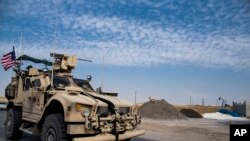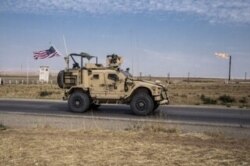U.S. troops tasked with protecting oil fields in northeastern Syria are helping ensure any profits flow to the mainly Kurdish Syrian Democratic Forces, a key partner in the fight against the Islamic State terror group.
U.S. President Donald Trump has repeatedly talked about securing the oil fields as a top priority despite the withdrawal of American forces, telling an audience last month, "We're keeping the oil … $45 million a month? Keep the oil."
But a key defense official said Thursday none of the profits has gone into Washington's coffers.
"The revenue from this is not going to the U.S., this is going to the SDF," Chief Pentagon spokesman Jonathan Rath Hoffman told reporters.
For weeks, U.S. officials have tried to downplay talk of potential profits as a driving force behind the Pentagon's force posture in northeast Syria, arguing the main concern has been Islamic State and its efforts to reestablish a caliphate.
"They've moved to a position where they are doing clandestine insurgent operations, but they still have an eye with trying to grow that back and our steps are to prevent that," Hoffman said of the terror group, also known as IS or ISIS. "One of the ways they would be able to grow that back is by obtaining access to revenue including the oil fields."
At the same time, though, officials have said revenue from the oil fields is critical to the U.S.-backed SDF.
A U.S. presence near the oil fields was necessary to "make sure SDF does have access to the resources in order to guard the prisons, in order to arm their own troops, in order to assist us with the defeat ISIS mission," Defense Secretary Mark Esper said late last month.
Some former officials and analysts have questioned the extent of the threat IS currently poses to the oil fields, arguing the larger danger comes from Syrian government forces, Russia and even Turkey.
The Defense Department Thursday acknowledged that the increasingly complex battlefield in northeastern Syria has been a factor and one of the reasons commanders decided to reinforce troops near the oil fields with armored vehicles.
"One thing we've all seen from Turkey's destabilizing movement into Syria is that things have changed,” Hoffman said. "There's now a larger number of players on the field. There's a larger number of militaries operating."
The decision to guard the oil fields has drawn praise from Iraqi Kurdish officials, who warn any access to oil could further enable an already emboldened IS insurgency.
"I think that's important," Bayan Sami Rahman, the Kurdistan Regional Government representative to the United States, told VOA.
"We don't want ISIS to have access to any revenues whatsoever to become any stronger," she said, citing a 300% increase in the terror group's attacks in Iraqi Kurdistan over the past year.
Other U.S. defense officials share the concern.
"I'm not sure ISIS is going away yet," Rear Admiral William Byrne, the vice director of the joint chiefs of staff, said Thursday. "That's why we're there, to help them go away," he said, adding the ultimate number of U.S. troops charged with guarding the oil fields would be "conditions based."
Meanwhile, IS media officials signaled again Thursday that the death of former leader Abu Bakr al-Baghdadi was not having any detrimental impact on its global support network.
IS-linked media accounts distributed 10 photographs showing fighters with the group's West Africa affiliate pledging loyalty to newly named caliph Abu Ibrahim al-Hashimi al-Qurashi.
Analysts see IS West Africa, with its estimated 3,500 fighters, as one of the stronger and more influential of the group's various affiliates.
Half of IS' 14 global affiliates have now pledged allegiance to Qurashi, including IS affiliates in Afghanistan and Egypt's Sinai peninsula.






